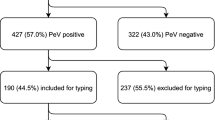Summary.
Sapporo-like viruses (SLV) are a causative agent of gastroenteritis in humans. SLV-specific primers were newly designed in capsid protein-coding region and 529 fecal samples collected from gastroenteritis patients were tested. Thirty-five samples (6.6%) were found to be positive by reverse transcriptase-polymerase chain reaction (RT-PCR). Out of 35 positive samples, 25 were classified into a genogroup SG-I, typified by the Sapporo virus, and 9 were classified as a genogroup SG-II, typified by the London virus. Interestingly, one sample could not be classified into any genogroup, which suggests that it may be part of a new SLV genogroup. The RT-PCR used in this study appeared to be capable of widely detecting SLV genogroups, and it was seen to be powerful enough for molecular epidemiological as well as phylogenetic studies on SLV.
Similar content being viewed by others
Author information
Authors and Affiliations
Additional information
Received January 25, 2002; accepted March 8, 2002 Published online May 24, 2002
Rights and permissions
About this article
Cite this article
Okada, M., Shinozaki, K., Ogawa, T. et al. Molecular epidemiology and phylogenetic analysis of Sapporo-like viruses. Arch. Virol. 147, 1445–1451 (2002). https://doi.org/10.1007/s00705-002-0821-7
Published:
Issue Date:
DOI: https://doi.org/10.1007/s00705-002-0821-7




